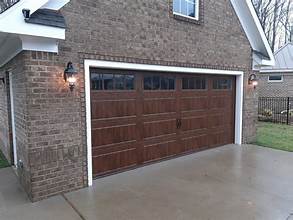Garage Door Fix: Common Issues and Solutions
Garage doors are often the unsung heroes of our homes, quietly working day in and day out to provide security and convenience. Yet, like any mechanical system, they're prone to wear and tear, occasionally requiring a bit of attention to keep them functioning smoothly. Whether it's a sudden malfunction or a gradual decline in performance, knowing how to troubleshoot common garage door issues can save you time, money, and frustration. In this article, we'll explore some of the most frequent problems homeowners encounter with their garage doors and the steps you can take to address them effectively. 1- Unresponsive Remote Control One of the most common issues homeowners face is a garage door that doesn't respond to the remote control. If you find yourself pressing the button repeatedly with no luck, start by checking the batteries in the remote. If they're fresh and the problem persists, it could be due to interference from nearby electronics or a malfunctioning receiver. Try reprogramming the remote or relocating the receiver to see if that resolves the issue. 2. Noisy Operation Garage doors are typically not silent, but if you notice excessive grinding, squeaking, or banging noises during operation, it could be a sign of underlying issues. This often indicates a lack of lubrication on moving parts such as rollers, hinges, or tracks. Applying a silicone-based lubricant can help reduce friction and quieten the door's operation. If the noise persists, it may be a sign of more serious issues such as loose hardware or worn-out components that require professional attention. 3. Crooked or Off-Track Door A crooked or off-track garage door not only looks unsightly but also poses a safety hazard. Misalignment can occur due to damaged tracks, loose hardware, or worn-out rollers. Attempting to force the door back on track can cause further damage and should be avoided. Instead, carefully inspect the tracks and rollers for any signs of damage or obstruction. Tighten loose hardware and gently realign the tracks if necessary. For significant misalignment or structural damage, it's best to consult a professional garage door technician. 4. Slow or Uneven Movement If your garage door moves sluggishly or unevenly, it could be due to a variety of factors. Start by checking the springs, cables, and pulleys for signs of wear or damage. Tension springs are responsible for counterbalancing the weight of the door, and if they're worn out or broken, it can cause the door to move unevenly or struggle to open. Similarly, frayed cables or damaged pulleys can impede smooth operation. These components are under high tension and should only be inspected or repaired by trained professionals to avoid injury. 5. Complete Failure to Open or Close Perhaps the most frustrating issue homeowners encounter is a garage door that refuses to open or close altogether. This could be due to a malfunctioning opener, faulty sensors, or electrical issues. Start by ensuring that the opener is receiving power and that the circuit breaker hasn't tripped. Check the sensors near the bottom of the door to make sure they're aligned and free from obstruction. If everything appears to be in working order, the opener may need to be reprogrammed or replaced. In conclusion, while garage door issues can be frustrating, many common problems have relatively simple solutions that homeowners can tackle themselves. By familiarizing yourself with the mechanics of your garage door and performing regular maintenance, you can keep it running smoothly for years to come. However, for more complex issues or repairs involving high-tension components, it's always best to enlist the help of a qualified professional. With the right knowledge and proactive approach, you can ensure that your garage door remains a reliable and convenient part of your home for years to come.
Scroll Down to Read More
